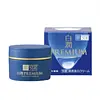What's inside
What's inside
 Key Ingredients
Key Ingredients

 Benefits
Benefits

 Concerns
Concerns

No concerns
 Ingredients Side-by-side
Ingredients Side-by-side

Water
Skin ConditioningHydroxyethyl Urea
HumectantButylene Glycol
HumectantGlycerin
HumectantPentylene Glycol
Skin ConditioningGlycol
HumectantPEG/PPG/Polybutylene Glycol-8/5/3 Glycerin
HumectantSqualane
EmollientTriethylhexanoin
MaskingAmmonium Acryloyldimethyltaurate/Vp Copolymer
Dimethicone
EmollientTriethyl Citrate
MaskingArginine
MaskingGlucosyl Ceramide
Skin ConditioningAlpha-Glucan
HumectantHydrolyzed Collagen
EmollientCamellia Sinensis Leaf Extract
AntimicrobialSodium Hyaluronate
HumectantHydrolyzed Hyaluronic Acid
HumectantSodium Acetylated Hyaluronate
HumectantAgar
MaskingCitric Acid
BufferingSodium Citrate
BufferingDisodium EDTA
Phenoxyethanol
PreservativeChlorphenesin
AntimicrobialDecylene Glycol
Skin ConditioningWater, Hydroxyethyl Urea, Butylene Glycol, Glycerin, Pentylene Glycol, Glycol, PEG/PPG/Polybutylene Glycol-8/5/3 Glycerin, Squalane, Triethylhexanoin, Ammonium Acryloyldimethyltaurate/Vp Copolymer, Dimethicone, Triethyl Citrate, Arginine, Glucosyl Ceramide, Alpha-Glucan, Hydrolyzed Collagen, Camellia Sinensis Leaf Extract, Sodium Hyaluronate, Hydrolyzed Hyaluronic Acid, Sodium Acetylated Hyaluronate, Agar, Citric Acid, Sodium Citrate, Disodium EDTA, Phenoxyethanol, Chlorphenesin, Decylene Glycol
Tranexamic Acid
AstringentCetyl Phosphate
EmulsifyingTocopherol
AntioxidantSodium Hyaluronate
HumectantHydrolyzed Hyaluronic Acid
HumectantSqualane
EmollientButyrospermum Parkii Butter
Skin ConditioningDipropylene Glycol
HumectantDiglycerin
HumectantLimnanthes Alba Seed Oil
Skin ConditioningDimethicone
EmollientGlyceryl Stearate
EmollientPEG-20 Sorbitan Isostearate
EmulsifyingPolyvinylalcohol Crosspolymer
EDTA
Hydroxyethylcellulose
Emulsion StabilisingSodium Metabisulfite
AntioxidantBehenyl Alcohol
EmollientStearyl Alcohol
EmollientPhenoxyethanol
PreservativeSodium Paraben
PreservativeTranexamic Acid, Cetyl Phosphate, Tocopherol, Sodium Hyaluronate, Hydrolyzed Hyaluronic Acid, Squalane, Butyrospermum Parkii Butter, Dipropylene Glycol, Diglycerin, Limnanthes Alba Seed Oil, Dimethicone, Glyceryl Stearate, PEG-20 Sorbitan Isostearate, Polyvinylalcohol Crosspolymer, EDTA, Hydroxyethylcellulose, Sodium Metabisulfite, Behenyl Alcohol, Stearyl Alcohol, Phenoxyethanol, Sodium Paraben
 Reviews
Reviews

Ingredients Explained
These ingredients are found in both products.
Ingredients higher up in an ingredient list are typically present in a larger amount.
Dimethicone is a type of synthetic silicone created from natural materials such as quartz.
What it does:
Dimethicone comes in different viscosities:
Depending on the viscosity, dimethicone has different properties.
Ingredients lists don't always show which type is used, so we recommend reaching out to the brand if you have questions about the viscosity.
This ingredient is unlikely to cause irritation because it does not get absorbed into skin. However, people with silicone allergies should be careful about using this ingredient.
Note: Dimethicone may contribute to pilling. This is because it is not oil or water soluble, so pilling may occur when layered with products. When mixed with heavy oils in a formula, the outcome is also quite greasy.
Learn more about DimethiconeHydrolyzed Hyaluronic Acid is a form of hyaluronic acid. It is created by the hydrolysis of hyaluronic acid with a high molecular weight. Once created, Hydrolyzed Hyaluronic Acid has a low molecular weight.
Low molecular weight HA has been shown to hydrate and increase elasticity of the skin. Increasing elasticity is also associated with reduction of wrinkle depth.
One study found topical low molecular weight hyaluronic acid may be considered for the treatment of rosacea in the adult population. However, we always recommend speaking with a professional about your skin concerns.
Hyaluronic acids are a humectant. This means they draw moisture from the air. Hyaluronic acids help moisturize, soothe, and protect the skin.
Read more about other common forms of hyaluronic acid:
Learn more about Hydrolyzed Hyaluronic AcidPhenoxyethanol is a preservative that has germicide, antimicrobial, and aromatic properties. Studies show that phenoxyethanol can prevent microbial growth. By itself, it has a scent that is similar to that of a rose.
It's often used in formulations along with Caprylyl Glycol to preserve the shelf life of products.
Sodium Hyaluronate is hyaluronic acid's salt form. It is commonly derived from the sodium salt of hyaluronic acid.
Like hyaluronic acid, it is great at holding water and acts as a humectant. This makes it a great skin hydrating ingredient.
Sodium Hyaluronate is naturally occurring in our bodies and is mostly found in eye fluid and joints.
These are some other common types of Hyaluronic Acid:
Learn more about Sodium HyaluronateSqualane is an emollient that helps the skin hold onto moisture. It's an oily liquid that occurs naturally in certain types of fish and plant oils.
Because squalane boosts hydration in the skin, it also comes with plenty of benefits: it is an antioxidant and can help fight free radicals and skin damage. Squalane is also found to have a detoxifying effect when applied.
Squalane comes from squalene, which occurs naturally within the sebum of our skin. It is one of the oils our skin produces to keep itself hydrated. Squalane is the hydrogenated version of squalene and has a longer shelf life.
Research shows that squalane is non-irritating (even at 100% concentration).
In general, it's a fantastic ingredient. It does a great job at hydrating the skin, and it's suitable for those with sensitive skin.
The source of squalane may impact malassezia / fungal acne. This is because olive oil derived squalane can contain impurities such as fatty acids and plant waxes. Sugarcane derived squalane is recommended for anyone with malassezia concerns.
Is squalane vegan?
This depends on the source. Squalane can be derived from both plants and animals. Most squalane used in skincare comes from plants.
Please note: the source of squalane is only known if disclosed by the brand. We recommend reaching out to the brand if you have any questions about their squalane.
Read more about squalene with an "e".
Is squalane an oil?
Squalane is often called an oil, but it’s technically not; it’s a hydrocarbon, meaning it’s only made of carbon and hydrogen, unlike true oils which are triglycerides made of fatty acids and glycerol.
The term “oil-free” isn’t regulated, so companies can define it however they want. Some exclude all oils, while others just avoid mineral oil or comedogenic oils.
While some people avoid oils thinking they cause breakouts, the right kind of oil (or oil-like ingredient like squalane) can actually help balance and hydrate your skin. It’s worth testing out simple oils or squalane to see what works best for your skin.
Learn more about Squalane